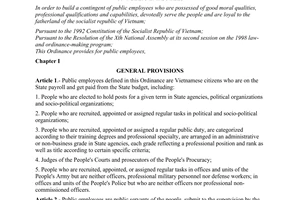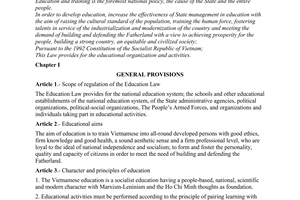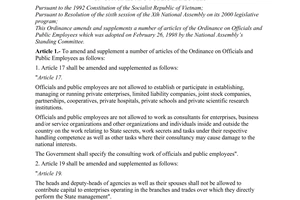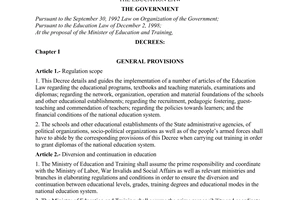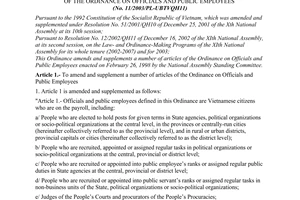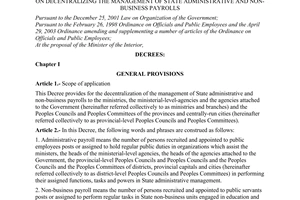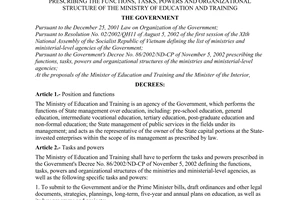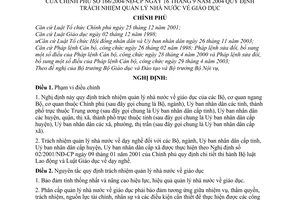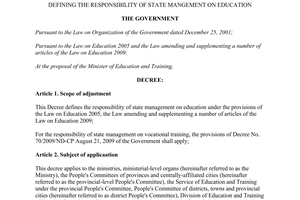Decree of Government No.166/2004/ND-CP of September 16, 2004 defining the education state-management responsibilities đã được thay thế bởi Decree No. 115/2010/ND-CP defining the responsibility of state mangement on education và được áp dụng kể từ ngày 15/02/2011.
Nội dung toàn văn Decree of Government No.166/2004/ND-CP of September 16, 2004 defining the education state-management responsibilities
|
THE
GOVERNMENT |
SOCIALIST
REPUBLIC OF VIET NAM |
|
No. 166/2004/ND-CP |
Hanoi, September 16, 2004 |
DECREE
DEFINING THE EDUCATION STATE-MANAGEMENT RESPONSIBILITIES
THE GOVERNMENT
Pursuant to the December 25,
2001 Law on Organization of the Government;
Pursuant to the December 2, 1998 Education Law;
Pursuant to the November 26, 2003 Law on Organization of the People's Councils
and People's Committees;
Pursuant to the February 26, 1998 Ordinance on Officials and Public Employees;
the April 28, 2000 Ordinance Amending and Supplementing a Number of Articles of
the Ordinance on Officials and Public Employees, and the April 29, 2003
Ordinance Amending and Supplementing a Number of Articles of the Ordinance on
Officials and Public Employees;
At the proposals of the Minister of Education and Training and the Minister of
Home Affairs,
DECREES:
Article 1.- Scope of regulation
1. This Decree defines the responsibilities for State management over education of the ministries, ministerial-level agencies, Government-attached agencies (hereinafter referred collectively to as ministries and branches), the People's Committees of the provinces and centrally-run cities (hereinafter referred collectively to as the provincial-level People's Committees), the People's Committees of rural districts, urban districts, provincial capitals and cities (hereinafter referred collectively to as the district-level People's Committees), and the People's Committees of communes, wards and townships (hereinafter referred collectively to as the commune-level People's Committees).
2. The responsibilities for State management over job-training of the ministries, branches, provincial-level People's Committees, district-level People's Committees and commune-level People's Committees shall comply with the Government's Decree No. 02/2001/ND-CP of January 9, 2001 detailing the implementation of the Labor Code and the Education Law regarding job-training.
Article 2.- Principles for defining education-State management responsibilities
1. Ensuring the uniformity and raising the effectiveness and efficiency of the State management over education.
2. Decentralizing the State management over education while ensuring the compatibility of the assigned tasks, powers, responsibilities, financial sources and personnel with necessary conditions for accomplishment of the decentralized tasks.
3. Defining specific tasks, powers and responsibilities of the ministries, branches and People's Committees of all levels for education while ensuring the activeness, creativity, autonomy and self-responsibility of education management agencies of all levels in deciding and performing the assigned and decentralized tasks.
Article 3.- The Ministry of Education and Training's education State-management responsibilities
The Ministry of Education and Training shall take responsibility for exercising the State management over education according to the provisions of Articles 86 and 87 of the Education Law, the Government's Decree No. 85/2003/ND-CP of July 18, 2003 defining the functions, tasks, powers and organizational structure of the Ministry of Education and Training, Articles 47, 48 and 49 of the Government's Decree No. 116/2003/ND-CP of October 10, 2003 on recruitment, employment and management of officials and public employees in the State non-business units and Articles 8 and 9 of the Government's Decree No. 71/2003/ND-CP of June 19, 2003 on decentralization of the management of State administrative and non-business payrolls.
Article 4.- The ministries' education State-management responsibilities
1. The ministries shall have to perform State management tasks and exercise State management powers as prescribed in the Government's decrees on their respective functions, tasks, powers and organizational structures; and at the same time, coordinate with the Ministry of Education and Training in ensuring the uniformity of the State management over education.
2. The ministries with attached education establishments shall also have the responsibilities:
a/ To contribute their opinions to the Ministry of Education and Training for the elaboration of framework curricula for tertiary and intermediate vocational education according to the provisions of Clause 3, Article 5 of the Government's Decree No. 43/2000/ND-CP of August 30, 2000 detailing and guiding the implementation of a number of articles of the Education Law.
b/ To direct and inspect attached education establishments in the implementation of the regulations on educational objectives, programs, contents and plans, teachers' criteria and examination regulations, and manage the diploma and certificate system according to regulations of the Ministry of Education and Training;
c/ To manage the organization, payrolls, personnel, finance, assets and material foundations of attached education establishments under law provisions; ensure conditions for teaching and learning activities as well as other activities of attached education establishments;
d/ To examine and inspect the education-law observance by attached education establishments; handle violations of, and settle complaints and denunciations against, attached education establishments according to law provisions.
3. The Ministry of Planning and Investment shall assume the prime responsibility for, and coordinate with the Ministry of Education and Training, the Ministry of Labor, War Invalids and Social Affairs, the Ministry of Home Affairs and the relevant agencies in, synthesizing the annual training and fostering criteria and incorporating them into the national socio-economic development plan to be submitted to the Prime Minister for approval; and be responsible for the rationality of such criteria, the satisfaction of practical demands and the balance of structure of the trained human resources;
4. The Ministry of Finance shall assume the prime responsibility for, and coordinate with the Ministry of Education and Training and concerned agencies in, estimating, allocating and organizing the use of the State budget; elaborate financial and budget policies, mechanisms, criteria and norms; ensure finance for, and conduct financial and budget supervision and inspection of, the field of education according to the provisions of the State Budget Law and relevant legal documents.
5. The Ministry of Home Affairs shall have the responsibilities:
To comply with the education and training payroll-management regulations provided for in Articles 8, 9 and 11 of the Government's Decree No. 71/2003/ND-CP of June 19, 2003 and exercise the management over education and training officials according to the provisions of Articles 46, 47 and 49 of the Government's Decree No.116/2003/ND-CP of October 10, 2003 on recruitment, employment and management of officials and public employees in the State non-business units.
Article 5.- The provincial-level People's Committees' education State -management responsibilities
The provincial-level People's Committees shall take responsibility for development of the educational cause of their provinces, perform the function of State management over education in provinces and have the following tasks and powers:
1. To map out educational development plannings, plans, programs and projects for provinces and submit them to the provincial-level People's Councils for adoption or to the Prime Minister for approval; ensure the conditions on budget, teacher payrolls, material and technical foundations; and direct and inspect the implementation by the provincial/municipal Education and Training Services, the concerned Services, Departments and branches as well as district-level People's Committees.
2. To exercise, according to their competence, the State management over schools and classes of all kinds assigned to them.
3. To decide on the setting up, merger, division, separation, dissolution and operation termination of senior secondary schools, ethnic minority boarding general education schools, provincial intermediate vocational schools, constant education centers, provincial educational administrator-fostering centers, and comprehensive technical- vocational orientation centers, in strict compliance with the planning, conditions and procedures set by the Ministry of Education and Training.
4. To direct the training and fostering of the contingent of teachers in provinces.
5. To decide on recognition of preschools, primary schools, junior secondary schools and senior secondary schools as satisfying the national standards in strict compliance with regulations of the Ministry of Education and Planning.
6. To define the organizational apparatus, tasks and powers of the provincial/municipal Education and Training Services under the guidance of the Ministry of Home Affairs and the Ministry of Education and Training.
7. To guide and direct non-business education and training units in elaborating payroll plans and complying with education and training payroll norms under the guidance of the Ministry of Education and Training; inspect non-business education and training units in the implementation of the financial, organizational and payroll autonomy and self-responsibility mechanism.
8. To manage and inspect the observance of teachers' criteria, regulations on examination as well as diploma and certificate granting according to law provisions.
9. To organize the realization of undertakings on education socialization and universalization in their provinces.
10. To supervise and inspect the observance of the education legislation in their localities according to law provisions.
11. To settle complaints, denunciations and handle violations in education according to law provisions.
12. To submit to the provincial-level People's Councils for approval the annual total administrative and non-business education and training payrolls of provinces on the basis of the payroll norms promulgated by the competent State agency. To decide on allocation of administrative payroll quotas to the provincial/municipal Education and Training Services.
Article 6.- Responsibilities of the provincial/municipal Education and Training Services
The provincial/municipal Education and Training Services shall assist the provincial-level People's Committees in performing the function of State management over education throughout their respective provinces:
1. To elaborate and submit to the provincial-level People's Committees educational development plannings, plans, programs and projects in localities; organize the implementation of such plannings, plans, programs and projects after they are approved by competent authorities.
2. To take responsibility for management of attached schools: constant education centers, ethic minority boarding general education schools, provincial-level educational administrator-fostering schools, comprehensive technical-vocational education centers, schools and classes for disabled people, pedagogic practice schools and establishments.
3. To assist the provincial-level People's Committees in managing professional affairs, organization, personnel, finance, assets and other educational activities of education establishments in strict compliance with law provisions.
4. To submit to the provincial-level People's Committees dossiers of application for operation licenses of organizations providing self-financed overseas study services in localities according to law provisions. To take responsibility for monitoring and inspecting operations of these organizations under law provisions and assignment by the provincial People's Committee presidents.
5. To guide, direct and inspect Education and Training Sections as well as education establishments of other services or branches in their performance of professional tasks.
6. To direct and inspect attached non-business education units in elaborating payroll plans; synthesize and elaborate educational payroll plans for the entire provinces under the guidance of competent management agencies.
7. To organize the annual drafting of the provincial budget for education to be sent to the provincial/municipal Finance Services and Planning and Investment Services, and estimate expenditures for national target programs according to law provisions. After being assigned budget estimates by the provincial-level People's Committees, to coordinate with the provincial/municipal Finance Services in allocating and assigning budget expenditure estimates, and guiding and inspecting the implementation thereof.
8. To assume the prime responsibility for, and coordinate with the provincial/municipal services, branches and district-level People's Committees in, eradicating illiteracy and universalizing education in their localities.
9. To organize the application of advanced scientific and technological experiences and achievements to education, sum up local experiences and initiatives; manage and direct scientific and technological research activities in schools and education establishments under their management.
10. To guide and direct emulation movements, formulate and popularize good educational models in provinces.
11. To work out and submit to the provincial-level People's Councils and People's Committees solutions to education socialization; direct, guide and inspect the implementation thereof.
12. To manage and direct the building, preservation and use of assets and material foundations of schools, as well as the distribution of textbooks, educational equipment, laboratory equipment and other educational facilities according to regulations.
13. To submit to the provincial-level People's Committees for promulgation or to promulgate according to their competence specific regulations on education management, mechanisms and policies for teachers and pupils in accordance with law provisions.
14. To supervise and inspect the observance of the education legislation; to handle violations and settle complaints and denunciations according to law provisions.
15. To comply with the prescribed reporting regime.
16. To perform other tasks as prescribed by law or authorized or assigned by the provincial-level People's Committees.
Article 7.- The district-level People's Committees' education management responsibilities
The district-level People's Committees shall perform the function of State management over education in districts; be answerable to the provincial-level People's Committees for development of preschool education, primary education and junior secondary education in districts:
1. To elaborate the districts' educational development programs and projects to be submitted to the People's Councils of the same level for adoption; organize, direct and inspect the implementation of the already adopted educational development programs and projects; and ensure conditions on budget, teacher payrolls as well as material and technical foundations for such implementation according to law provisions.
2. To exercise the State management over education establishments in localities.
3. To organize and inspect the observance of law provisions.
4. To direct illiteracy eradication and education universalization in districts and implement regulations on teachers' criteria and examination.
5. To direct and organize the implementation of undertakings on education socialization, the financial and organizational autonomy and self-responsibility mechanism, by district non-business education units according to law provisions.
6. To comply with the Government's regulations and People's Committees' guidance on the model of organizational apparatus and payrolls of Education and Training Sections; ensure enough administrative payroll quotas for Education and Training Sections to perform their assigned functions and tasks.
7. To settle complaints and denunciations and handle violations in education according to law provisions.
8. To decide on payroll quotas for Education and Training Sections within the total district administrative payrolls.
Article 8.- Responsibilities of Education and Training Sections
Education and Training Sections shall have to assist the district-level People's Committees in performing the function of State management over education in districts:
1. To assume the prime responsibility for elaborating and submitting to the district-level People's Committees educational development programs and projects of districts; organize the implementation of such programs and projects after they are approved by competent authorities.
2. To assist the district-level People's Committees in managing the professional affairs, organization, payrolls, personnel, finance, assets and other activities of preschools, kindergartens, primary schools, junior secondary schools, ethic minority semi-boarding general education schools and educational administrator-fostering schools of districts according to law provisions.
3. To guide and inspect public education and training establishments that fall under the district management in elaborating the annual non-business payroll plans so that the district-level People's Committees submit them to competent authorities for decision.
4. To organize the drafting of the districts' annual education budget and expenditures for national education target programs to be sent to the professional agencies of the district-level People's Committees according to law provisions. After being assigned the budget estimates, to coordinate with the district-level People's Committees' finance and planning agencies in allocating the education budget, and guiding and inspecting the use thereof.
5. To assume the prime responsibility for, and coordinate with the commune-level People's Committees in, effecting the education universalization in districts.
6. To organize the application of experiences and advanced technological and scientific achievements to education, sum up local experiences and initiatives.
7. To guide and direct the emulation movements of the education branch, formulate and popularize good educational models in districts.
8. To map out and submit to the district-level People's Councils and People's Committees solutions to education socialization; direct, guide and inspect the realization of education socialization.
9. To manage and direct the construction, preservation and use of assets and material foundations of schools; the distribution of textbooks and educational publications, laboratory equipment and other educational facilities under their management.
10. To request the competent authorities to handle violations in the field of education.
11. To perform other tasks as prescribed by law or authorized or assigned by the district-level People's Committees.
Article 9.- The commune-level People's Committees' education -State management responsibilities
The commune-level People's Committees shall exercise, according to their competence, the function of State management over education in communes and have the following tasks and powers:
1. To execute educational development plans in localities.
2. To coordinate with education establishments in localities in elaborating plans on building and repair of schools and classes in communes and submit them to the commune-level People's Committees for approval.
3. To coordinate with schools in registering and encouraging children to go to school and enter grade one at the right age, and finalizing the education universalization program; organize complementary classes, eradicate illiteracy.
4. To build, manage and inspect the operation of crèches, kindergartens and preschool classes, flexible primary school classes and family-based primary education classes in localities.
5. To coordinate with Education and Training Sections in managing kindergartens, preschools, primary schools and junior secondary schools in localities.
6. To organize the realization of education socialization undertaking; formulate a healthy educational environment, mobilize people to coordinate with schools in educating their children and to take part in the protection and maintenance of works for pupils' study and recreation activities; mobilize sources for development of the communes' educational cause.
Article 10.- Implementation provisions
1. The Minister of Education and Training and the concerned ministers shall guide the implementation of this Decree.
2. This Decree takes effect 15 days after its publication in the Official Gazette. The previous regulations contrary to this Decree are hereby annulled.
3. The ministers, the heads of the ministerial-level agencies, the heads of the Government-attached agencies and the presidents of the People's Committees of the provinces and centrally-run cities shall have to implement this Decree.
|
|
ON BEHALF OF THE
GOVERNMENT |
